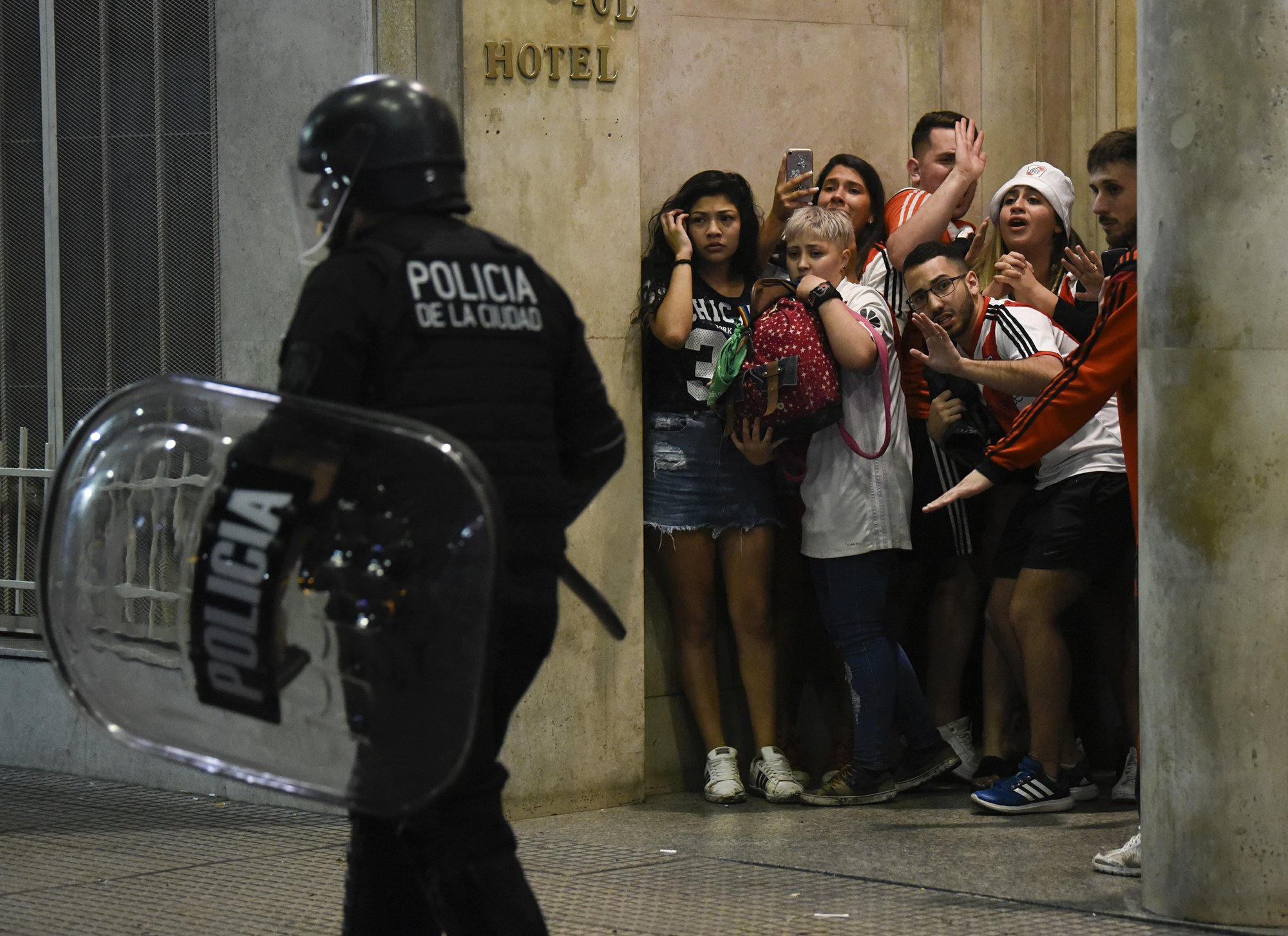
Fans hide from the police after River Plate soccer fans celebrated their team’s 3-1 victory over Boca Juniors, clenching the Copa Libertadores championship title, at the Obelisk in Buenos Aires, Argentina, Sunday, Dec. 9, 2018. The South American decider was transferred from Buenos Aires to Madrid, Spain, after River fans attacked Boca’s bus on Nov. 10 ahead of the second leg. (AP Photo/Gustavo Garello)
MADRID — The Copa Libertadores finally came to a conclusion, without incident.
River Plate fans peacefully celebrated the team’s triumph over Boca Juniors as the city of Madrid showed it is possible to successfully organize the high-profile game between two of the South American continent’s fiercest rivals.
But there were doubts the happy ending at Santiago Bernabeu Stadium would prompt many changes after one of the greatest debacles in South American soccer history.
“To be honest, sometimes it seems like we are incapable of learning,” Boca Juniors coach Guillermo Barros Schelotto said. “I don’t think we will be able to take much from what happened in this stadium, from how the fans behaved here. Hopefully we will learn a lot, but it seems like we are incapable of learning. It seems that if this final happens again in a few years, we won’t be able to play it again.”
River Plate won 3-1 in extra time on Sunday in a match that was relocated to Madrid after the first leg was twice suspended because Boca players were injured when River fans attacked their bus with rocks, bottles and pieces of wood. The teams drew 2-2 in the first leg at Boca’s La Bombonera Stadium nearly a month ago.
Nearly 70,000 River fans waited for hours inside the team’s stadium two weeks ago before South American soccer governing body CONMEBOL suspended the match and later decided to play it outside Argentina because of safety concerns.
“Everybody knows that a lot of people wanted to watch this final,” River captain Leonardo Ponzio said. “But we have to be realistic, our society is not prepared for this type of event. This final is over, but a lot of things still need to be solved. All we can do is make sure that all of this never happens again.”
While hundreds of River Plate fans celebrated in Madrid’s iconic Puerta del Sol plaza, riot police had to take action against rowdy fans back in Buenos Aires. Argentine media said some fans were detained and a few police officers sustained minor injuries in the downtown confrontations.
It wasn’t even certain that the Madrid final was actually the end of it all, as Boca could still try to appeal CONMEBOL’s decision not to disqualify River for the problems outside its stadium ahead of the second leg.
“As far as the sports side is concerned, to me it’s all over. River won,” Schelotto said. “As far as all the legal issues, it would be good for CONMEBOL or South American soccer to take some action. Not about who won the Copa or about sanctions to River or Boca, but to make sure that what happened the other day doesn’t happen again. It’s not normal to throw rocks at a bus of a rival team. Hopefully these things will not happen again.”
This year’s Copa Libertadores, South America’s equivalent to the Champions League, had been tarnished even before the fan violence marred the first leg of the “final of all finals” in Buenos Aires.
River Plate coach Marcelo Gallardo ignored a ban from carrying out his duties in the semifinals against Brazilian club Gremio, and both River and Boca played with suspended players without punishment. There were also controversial video review decisions, including a red card reversed following a game as officials later concluded it was incorrectly shown to a player despite video review being used.
CONMEBOL had already decided that beginning next year the Copa Libertadores final will be played in a neutral site with a single game, with Chile hosting it in 2019.
River assistant coach Matias Biscay, replacing the suspended Gallardo, said he hoped the team’s victory would help ease the disappointment of those who missed the opportunity to witness the historic final this time.
“Not everybody is violent in our society, it’s just a small group,” Biscay said. “I think the people who behaved well and were patient the other day can enjoy a little bit of happiness after what the players achieved for them on the field.”

